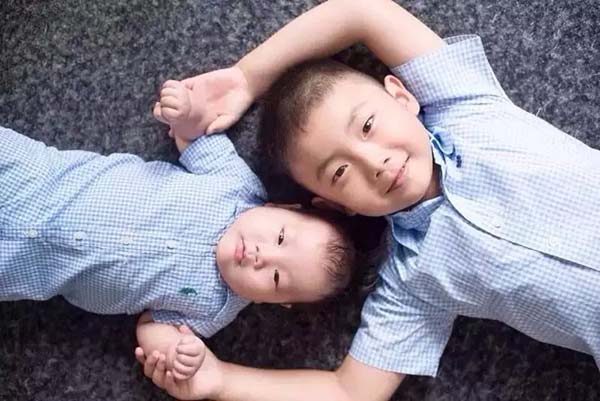Two-child policy expected to be approved by top legislature
Updated: 2015-12-21 09:54
By WANG XIAODONG(chinadaily.com.cn)
|
|||||||||||
 |
|
A boy with his younger brother. [Photo provided by Zhai Xiaoyan to chinadaily.com.cn] |
All couples in China are encouraged to have two children, according to a draft amendment to China's national law on population and family planning proposed to China's top legislature for review on Monday.
China's top leadership announced the universal two-child policy at a meeting in late October, but it has to be approved by the National People's Congress before it becomes law.
It is widely expected that the draft revision could be passed when the legislature closes its biomonthly session on Sunday.
The draft, proposed by the State Council, China's Cabinet, to the National People's Congress for review, said couples who have two children can enjoy longer maternity leave. It also said couples could have more than two children if they are eligible.
The draft said the two-child policy would come into force on Jan 1.
Relaxation of the family planning policy is expected to provide part of the solution to the challenge of an aging population, and to become a new driver for the economy in the long run.
By the end of 2014, the number of people over 60 years of age had reached 212 million, accounting for 15.5 percent of the total population. Of those, about 40 million were disabled or partly disabled.
The new two-child policy could increase economic growth rate by 0.5 percentage points through reducing China's dependency ratio, said National Health and Family Planning Commission in November.
The change in policy is expected to mean over 30 million more people in the labor force by 2050 and an decrease of 2 percentage points in the share of elderly of Chinese population, said Wang Pei'an, deputy head of the commission.
The draft also forbids surrogacy in any form, and forbids buying or selling of sperm, eggs, fertilized eggs and embryos. It allows authorized medical institutions to conduct assisted reproductive procedures after approval from provincial-level health authorities.
Related: Two-child policy puts pressure on sperm banks
By Xinhua in Nanchang
China's sperm banks are already facing a shortage of donors, and a government proposal to end the country's decades-old family planning policy may put more pressure on the institutions.
Related Stories
Fatherhood the key to two-child families 2015-11-30 07:39
Ease education burden to spur two-child policy 2015-11-18 07:50
Two-child policy could start in January, official suggests 2015-11-14 08:08
Beijing expected to implement two-child policy in 2016 2015-11-10 21:38
Two-child policy to increase potential economic growth rate 2015-11-10 17:17
Two-child policy won't lead to a baby boom 2015-11-08 11:41
Today's Top News
Germany becomes AIIB's fourth largest shareholder
Spanish PM to form new govt after elections
Two-child policy expected to be approved
IMF head ordered to face trial over Tapie affair
China, Russia sign over 30 deals on Medvedev visit
Xi calls for shared future in cyberspace
China successfully launches its first dark matter satellite
China becomes shareholder in European bank
Hot Topics
Lunar probe , China growth forecasts, Emission rules get tougher, China seen through 'colored lens', International board,
Editor's Picks

|

|

|

|

|

|






